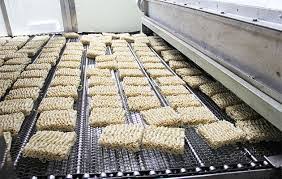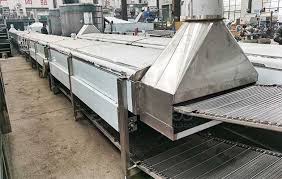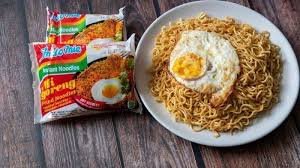![]()
If you’ve landed on this article page, you’re probably searching for a
good business idea—an idea that’s light on the pocket but heavy on
returns, promising both a fulfilling journey and potential profit.
| How to
start the production of Instant
Production in Nigeria
Instant noodles are made with fine wheat flour and a combination
of alkaline salts. Various additional ingredients are also added
to the dough in smaller quantities such as starch, edible oil,
gluten, and stabilizers like guar gum. Instant noodles are dried
noodles that have been dehydrated in one of two ways: flash
frying or air frying.
Instant noodles come in different flavors, as well as vegetarian
and non-vegetarian options. Moreover, the manufacturers keep
formulating new flavors, colors, textures and
seasonings/tastemakers, according to regional tastes and
preferences, in order to expand their consumer base.
The increased demand for quick-to-prepare foods like instant
noodles is fueled by increasing urbanization, a growing middle
class, and an increase in working women.
Instant noodle’s quick preparation time, microwave heating, and
inventive packaging methods are some of the elements
contributing to their rising appeal among the working-class
population.
The global instant noodles market size was valued at USD 47.32
Billion in 2022 and is projected to reach USD 70.80 Billion by
2030, growing at a compound annual growth rate (CAGR) of three
point ninety-nine percent (3.99%) from 2023 to 2030.
Nigeria has been rated one of the largest markets for noodles
consumption globally. The World Instant Noodles Association
(WINA), in its latest report, ranked Nigeria 11th in the global
demand for noodles, putting Nigeria among the largest consumers
of instant noodles.
The country consumed over two billion, seven hundred and ninety
million (2,790,000,000) serving of instant noodles in 2022
growing at about six percent (6%) per annum.
The meal of instant noodles was scarcely popular in Nigeria
until a few years back when it was introduced. By then, the
seventy (70) gram pack sold for just two naira fifty kobo (₦
2.50) but now it retails for between one hundred and fifty naira
to four hundred and fifty naira (₦ 300 and ₦ 500) per pack
depending on the size.
The production capacity of the proposed plant is one (1) unit of
one hundred and fifty thousand (150,000) pieces per eight (8)
hours for the one hundred to one hundred and twenty (100 -120)
grams size, one (1) unit of one hundred and sixty thousand
(160,000) pieces per eight (8) hours for the seventy (70) grams
size, one (1) unit of 6T automatic feeding system steam boiler,
three (3) units of packaging machines and two (2) units carton
sealing machines.
Instant noodles have repeat sales tendency and the
transportation cost per Naira value of the product is low. So
apart from producing to satisfy local demand one can embark on
export to earn scarce foreign exchange. Currently in Nigeria, we
are aware of only one producer. So there is more than enough
room for new entrants to make a decent living.
Raw Materials
The major raw material is wheat powder having ash content of
between 0.5 and 0.4%. Others are carbonic salt, common salt and
lard (oil). Carbonic salt water gives the noodles special
stickiness, elasticity, smoothness and taste while lard is for
frying. Common slat helps make the noodles homogeneous,
regulates the stickiness and adds salty test.
Other flavouring or seasoning additives include onion powder,
MSG, Hydrolised vegetable protein (preferably soybean-based),
chili powder, phosphoric acid salt, starch powder, etc. The
noodles can be fortified by adding industry-approved quantities
of such vitamins as B and D. The flavourings (called soup) are
usually packed separately in small cellophane before being
enclosed in the packaged fried noodles.
For packing, one needs poly-cellophane (300 mm x 190 mm), carton
boxes (which may contain about 30 pieces) and packing tape. One
can see that virtually all he raw materials needed can be
obtained locally. The remaining will be imported.
Required Equipment
The machinery and equipment needed are
Noodles making machine
Measuring and cutting equipment
Fryer
Cooling equipment
Other accessories include steam boiler, edible and heavy oil
tanks, kneader base, and chimney and furnace materials.
The first four items will be imported and come in one block.
Utilities like electricity (35kwh), heavy oil (40kg) and steam
(200kg) are needed.
A standby generator of appropriate capacity is a must to ensure
power supply.
Production Process
Nine distinct processes are involved in the production of
noodles and these are briefly described below.
Wheat powder and additives are dissolved in carbonic salt
solution for about 10 to 15 minutes making sure that the
quantity of water and salt is such that the required viscosity
is maintained as this is influenced by atmospheric temperature.
The noodles are now cut and the weight calculated bearing in
mind the dough thickness, weight and the conditions under which
the dough was made. The cut-measured noodles are now steamed.
During this process, the protein in the dough changes to
alpha-protein because of heat. This makes the dough strips
stickier and smoother in just one minute and under the steam
pressure of 1.5-2.5kg/cm3.
On getting out of the measure cut machine the noodles curl and
are now put in cases in order to prevent deformation during
frying. The cased noodles are fried. This process eliminates
moisture, secures a permanent form for the noodles and promotes
the process of alphanisation. This takes 1 to 1.5 minutes at a
temperature of 140oC-150oC.
The fried noodles are cooled by air in order to solidify the
lard (oil) used in frying, which has now fixed on the surface of
the strip noodles. After this they are packaged in poly
cellophane bags measuring 300cm x 190cm before being packed in
carton boxes containing 30 packs of noodles. The cartons are
cello taped and the instant noodles are ready for the market
after they have been inspected as to form, quality, colour and
weight.
Labour
The total number of people needed to run one shift of production
is 18 and includes workers of various skills. Being a food
processing business the promoter should ensure proper hygiene
and adequate recruitment and training of the relevant skilled
line staff.
Project Cost
The actual cost will be established in the process of conducting
current feasibility studies which will put many factors into
considerations. We will handle this if you contact us.
Implementation
Implementing this project will take the following steps
Commissioning the preparation of a comprehensive feasibility
study
Acquisition and development of the project site
Erection of the factory and buildings
Sourcing for funds
Purchasing project vehicles
Recruitment and training the relevant staff
Purchasing and installing the machinery, equipment and necessary
utilities
Test running and commissioning of the factor for commercial
operation
Get our Practical information on how to set up a lucrative
instant Noodles Production Company in Nigeria. This project is
highly recommended to serious industrialists as it will attract
financing from the industrial development banks for its
establishment because of its profitability, innovativeness,
value added advantages, future prospects and overall effects in
the development of the economy. There is no doubt that the above
write up is but schematic. Therefore any serious investor who
wants further information or a sound techno-economic viability
report is advised to contact the writer.
|







